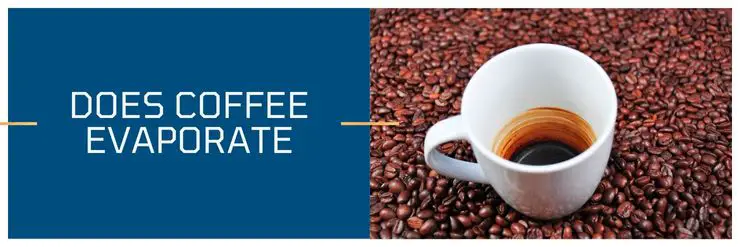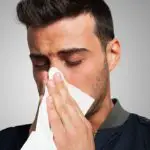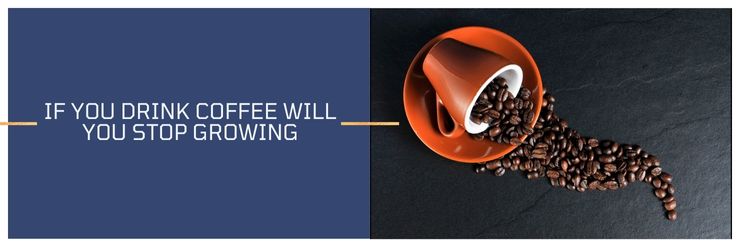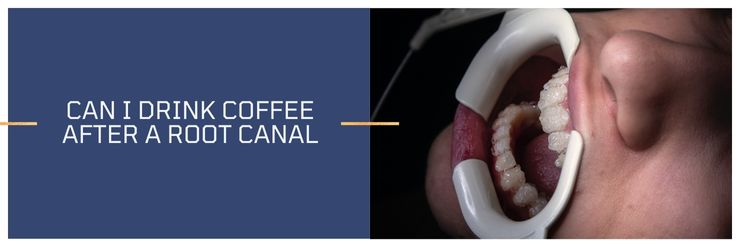We all know that coffee is a delicious morning drink, but does coffee evaporate?
Yes, the liquid gradually transforms into a gas and leaves your cup. The good news is that this process doesn’t happen overnight so you have plenty of time to enjoy your caffeine fix.
The bad news is that if you don’t drink it all, you’re going to be left with a stale cup of coffee. So next time you’re sipping on some Joe, remember that it’s slowly disappearing right before your eyes!
Does Coffee Evaporate
Coffee does evaporate but it is majorly the water content and not the caffeine. The water in coffee evaporates at around 100 C but the temperature of most home coffee makers is nowhere near this. The average coffee maker brews coffee at around 96 C.
The reason why your coffee tastes different as it cools down is because the water has already started to evaporate, taking some of the flavors with it. This is why it’s important to drink coffee fresh and not let it sit for too long.
If you want to know if your coffee is evaporating, just take a look at the cup after an hour or so. If there’s a noticeable drop in level, that means evaporation has occurred!
it is important to understand that evaporation is a type of phase change.
This means that the liquid coffee is changing into a gas. For this to happen, the molecules in the coffee must have enough energy to break apart the intermolecular attractions that are holding them together in liquid form.
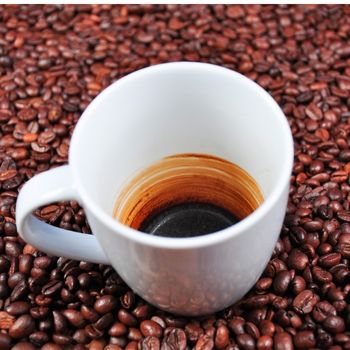
Once these attractions are broken, the molecules can escape into the air as a gas.
So, what causes some of the coffee molecules to have enough energy to escape?
Well, it all has to do with temperature. The higher the temperature, the more kinetic energy the molecules will have.
This means that at higher temperatures, more molecules will be able to escape into the air.
So, if you’ve ever noticed that your coffee seems to evaporate faster on a hot day, there’s a scientific reason for it!
The high temperature is causing more of the molecules to escape into the air.
As we mentioned before, when coffee evaporates, the molecules escape into the air.
But where do those molecules go? Well, they actually end up in your nose!
When you take a sip of coffee, you’re not just smelling the coffee beans, you’re also smelling the molecules that have evaporated from the coffee.
So, if you want to experience the full flavor of your coffee, it’s important to let it evaporate a bit before you drink it.
If you’re in a hurry, you can always put a lid on your coffee pot to prevent too much evaporation from happening.
But if you want to savor the flavor of your coffee, it’s best to let it evaporate a bit before you drink it.
When Coffee Evaporates is the Caffeine Lost
When you make a cup of coffee, the water doesn’t just magically disappear – it turns into steam and evaporates.
And as the water evaporates, so does the caffeine, but at a small mostly unnoticeable rate. So if you’re concerned about your caffeine intake, it’s best to avoid evaporated coffee. Same with old coffee and caffeine, most of the caffeine and coffee will stay in the cup while the water evaporates.
However, it’s worth noting that the majority of the caffeine is lost during the first few minutes of brewing. So, if you’re not worried about getting a buzz, you can still enjoy a cup of Joe.
The Bottom Line- Whether you’re concerned about your caffeine intake or you just want to enjoy the full flavor of your coffee, it’s important to understand how evaporation works.
Be sure to let your coffee sit for a few minutes before you drink it, and if you’re in a hurry, put a lid on your cup to prevent too much evaporation from happening.
Can You Evaporate Caffeine?
When you make a cup of coffee, the water doesn’t just magically turn into caffeine – there’s a chemical process at work.
Caffeine is soluble in water, which means that it can be dissolved in water to form a solution. When you brew coffee, the hot water extracts the caffeine from the beans and dissolves it, creating a strong caffeinated solution.
However, when this solution is left to cool, the reverse process happens and the caffeine starts to re-crystallize out of the solution.
This is why cold brew coffee has less of a kick than hot brewed – some of the caffeine has already been evaporated out.
If you want to remove even more caffeine from your coffee, you can evaporate it.
By heating the coffee until all the liquid has evaporated, you’ll be left with a highly concentrated caffeinated powder. The caffeinated powder can be added back to hot water to make a strong cup of joe.
So, if you’re looking for a stronger cup of coffee or you want to reduce your caffeine intake, evaporating your coffee is a good option. Just be sure to store the powder in an airtight container so it doesn’t lose its potency.
How Fast Does Coffee Evaporate?
Have you ever noticed how, when you leave a cup of coffee out on the counter, it seems to evaporate?
Well, technically, it’s not the coffee that’s evaporating. It’s the water in the coffee that’s turning into vapor and rising into the air.
So how fast does coffee evaporate? It depends on a few factors, including the temperature of the room and the size of the coffee cup.
Generally speaking, though, a cup of coffee will lose about 1% of its water content per hour. So if you leave a cup of coffee out for 3 hours, about 3% of the water will have evaporated.
Of course, this also means that your coffee will become increasingly concentrated as it loses water to evaporation.
So if you’re looking to enjoy a cup of freshly brewed coffee, it’s best to finish it relatively quickly. Otherwise, you’ll be left with some pretty strong stuff!
Conclusion
Surprisingly, coffee is 98% water. When coffee beans are roasted, about 18% of the weight is lost in vaporization.
The rest of the weight loss (82%) is from bean oils that are released. These oils make up the flavor and aromas we enjoy in our cup of joe.
So, does coffee evaporate over time, the answer is no – it’s mostly water.
But, that doesn’t mean your coffee isn’t losing flavor! Oils can dissipate over time, leading to a less flavorful cup of coffee. To prevent this from happening, store your beans or grounds in an airtight container at room temperature.

